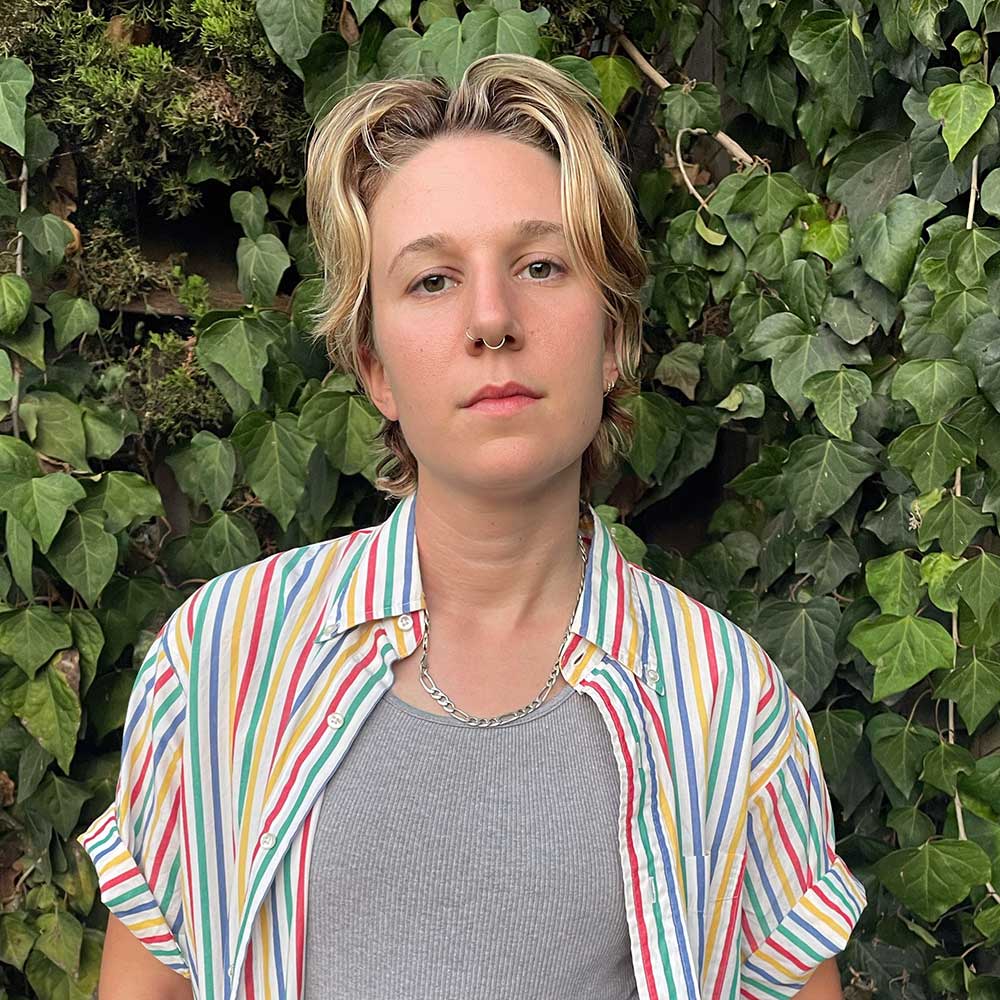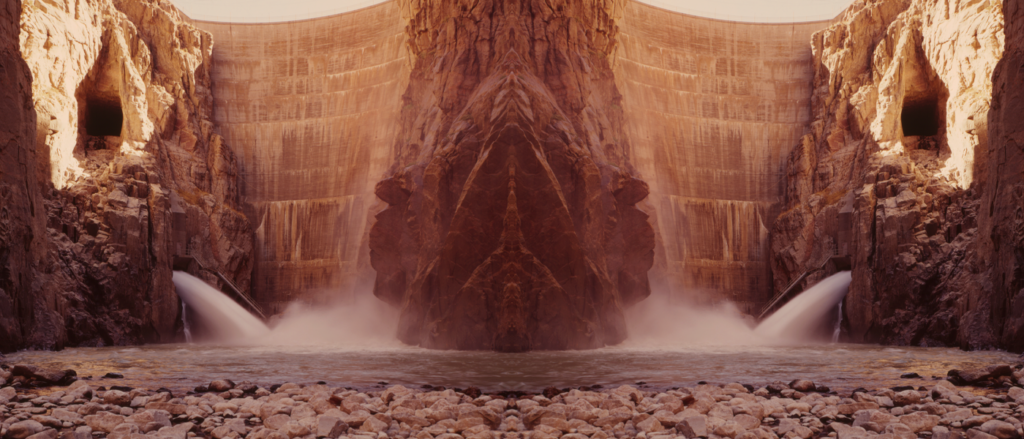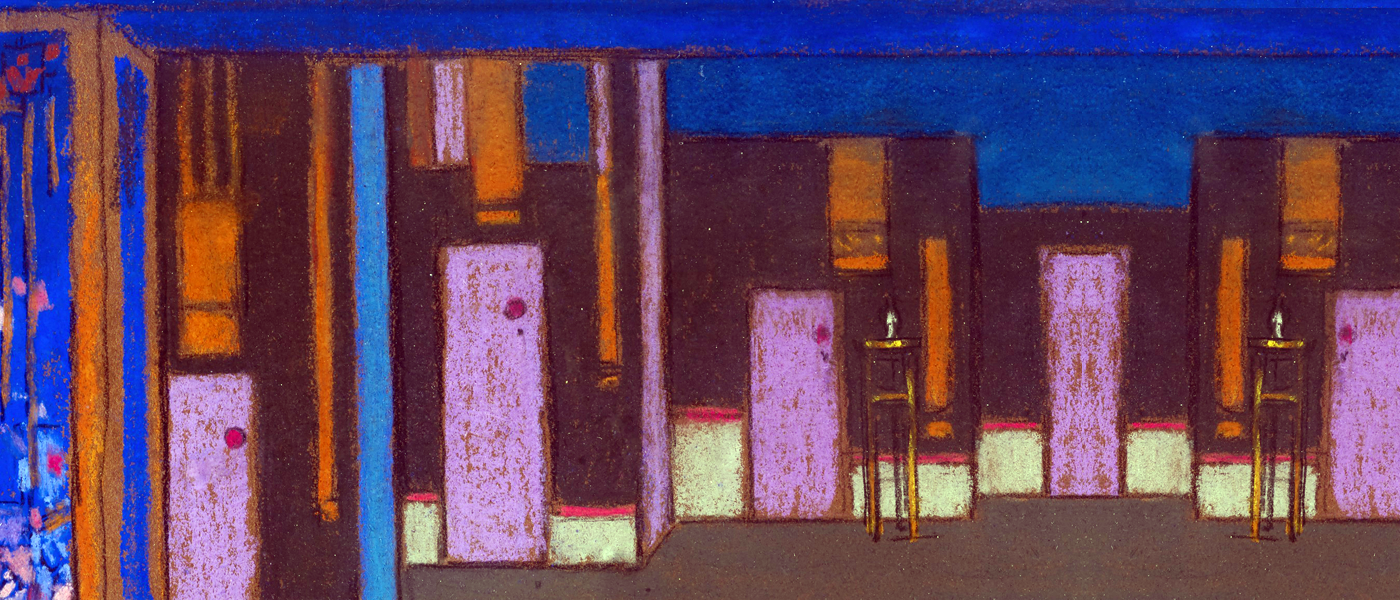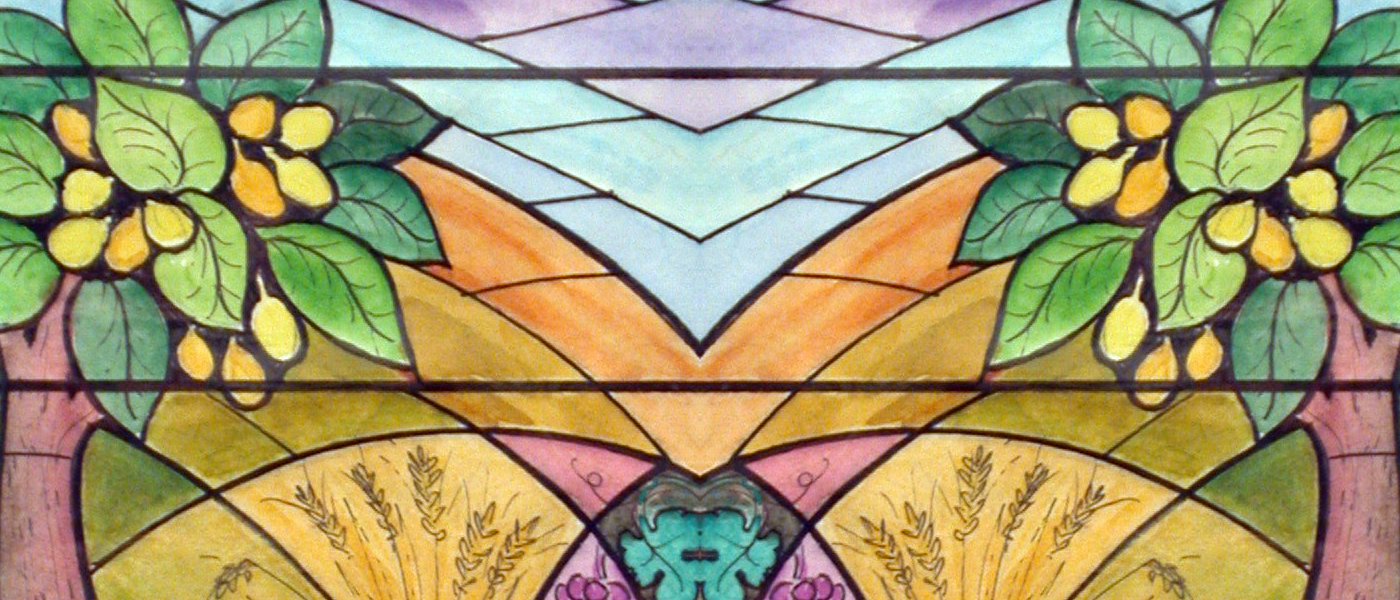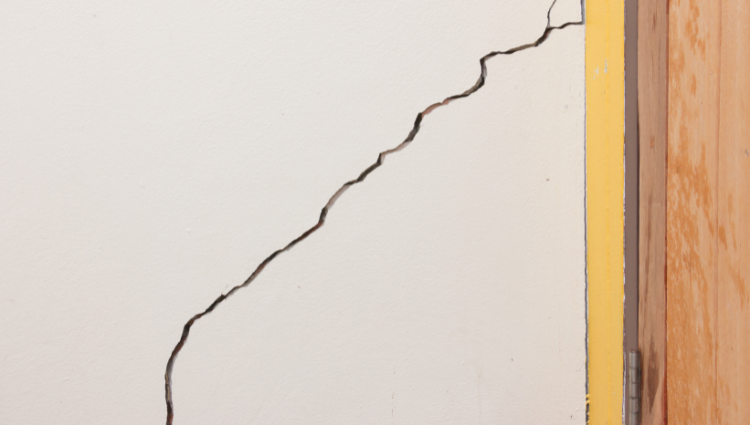I.
I was being led by something. So tender and raw inside of my body that I can’t point to a specific place — there was me before I had ever seen a dam. And then, there was me, after. It happened quickly: soon I was obsessed. Only a matter of days before I decided I had to go see another one, and then another. All I wanted was to touch the dams. To close my eyes and press my body up against them, feel the stone chafe my skin, through the clothing. In my fantasy, I would press so hard that we would become one. And I would weep. The weeping, all the weeping I wasn’t able to do, it would all become dislodged at the dams. Into the stone. Onto the grass. Torrents and torrents of weeping.
The first dam I ever saw was in Colorado, just north of the city of Boulder, where I was spending the summer working on my writing and sleeping on a couch. I didn’t know the person whose couch I was sleeping on very well — we tended to stay on opposite sides of the house.
It was a Tuesday. I was driving through the mountains with a friend from childhood whom I hadn’t done a very good job of keeping in touch with. He had invited me to go with him for a hike inside of a canyon. In Colorado, the mountains eat up everything quickly — suddenly you are surrounded, rocks that wave and shudder and slope up extremely high. It was my first time going so deep into the exposed slags of earth. We first passed the dam in the car as we drove north. It was chunky and flat, slicing up straight into the air, surrounded on all sides by the greenest trees. I felt as if I’d been punched in the gut by something so obvious, and yet impossible. On our way back south, I made my friend pull over onto the side of the road when we passed it, so that I could get closer. As I walked towards it, I felt the enormity of the drop — the enormity of the space that it was carving into thin air. Fences and signs and little carved paths of water surrounded it on all sides, clogging it, keeping me from it. But there it was: in front of me, all around me. Every shade of grey that I had ever seen. Abruptly, like a charade. The closest I could get was clinging onto the chain link fence, pressing my mouth and fingers through.
The imprint of the dam pressed across the back of my eyes — the entire hike, I was experiencing it. The strangeness of it. How it stood there: jutting out from the surrounding forest like a stone apocalypse. Anachronistic. I didn’t know into which year its architecture was facing. Everything was going both backwards and forwards all at once, with only the dense trees as witness. And then, right up the road, the land opened up into a vast blue sparkle — the reservoir. I remember thinking, This plus this equals this?! I saw the relationship between the dam and the reservoir, and inside of me I knew something important was happening, was being represented. I was involved in a landscape that was showing the skin beneath the clothes while the clothes were still on. Something very big and very strong was holding an immense amount and acting so casual about it. The water pooling into the wide expanse behind the big stone wall was the same water coming in bursts along the creek bed where I’d put my feet when I wanted to feel an icy sensation. I didn’t understand how the two could be connected. The gushing of the creek and the static of the reservoir. How did it build its force and how did it, at the same time, stay so tediously in place? The reservoir sat in the middle of that leafy terrain like a bleary portal into another world.
I had been spending all summer with my feet in creek water, letting the ice of its galloping currents shock me into submission. It was the only salve I had been able to find for the pain I was in. Deep, deep pain — a gripping break-up, a father recovering from cancer, a mother with untrammeled mental illness and a penchant for behavior that drew blood. Everyone was acting out that summer. Most evenings, it felt like all I had was poetry and the audacious coldness of the creek.
Later that summer, I met with a poet who told me that in order to heal from the pain I was in with my mother, I had to hold a piece of rose quartz in my left hand and write as quickly as I could with my right hand. I had to do this three times a day for ten minutes each. Most importantly, I had to bury the stone in the ground each night so that it could clear itself of my energy, so it could be spacious enough to help me heal. I did this every day for an entire week and made sure to have the crystal on me at all times. On the last day, the rock fell out of my shirt pocket as I was leaning forward to spoon lentils into a bowl and fractured into three pieces on the floor. This felt ominous — it meant either that my pain was dissipating, or that my pain was too much.
I wrote in my journal:
July 16
I am looking for the river, looking everywhere for the river. I find big tall walls connecting different mountains. When I get dirt in my eyeballs, I don’t wipe it away. I want to see things unclearly. I want to see things you can’t see at all.
II.
In September, I went home to New York to help take care of my father after a relapse scare put him back in the hospital for a week. Two years earlier, he had been ravaged by an aggressive leukemia lymphoma that kept a catheter dredged into his left arm for over a year because of how frequently he needed to be injected with chemo. His body took on a new hue, soft wrinkly pink, like a sick baby. My new father was quiet, was tired, was bald, had a rasp clinging to his voice. We have very little in common, so I asked him to come to the dams with me, thinking it might be an outing that would give us both something to do while we were spending time with each other. He knew of a dam nearby, he said, a dam in upstate New York that he remembered had been renovated during his childhood. That’d be pretty neat, to get to go up and see that again. It’s been years. The dam was monstrously large, imposing in its unspoken reference to divinity. Like the walls of a temple, or castle, rising so endlessly high — opulently decorated with greco-roman carvings and turrets. I could feel the edges between man, god, and nature blurring in the weight and precision of the carved stone. My body always flashes numb, in that first moment that I see the dam: see the force of how much is being held back. And how, in the fine lines detailing the wall, we worship this kind of restraint. I pictured my father as a boy, with sparklers in hand, running through the grassy fields at the dam’s base. I pictured him knowing so little about what he was embedded within.
At the dam, I wrote in my notebook as quickly as I could with my right hand while he listened to his book on tape from the library, a history of Christianity from the late Roman Empire. Because his body was so physically compromised and easily fatigued, he had taken to checking out multi-disc history books from the library and listening to them on his CD player. I had never known him to have much interest in history, or reading. Once, when I asked him what he did with all his time lying in his hospital bed, he said, I was thinking.
My father thought I was there to work on some kind of a historical book report, and I could tell it gave him a way to feel proud of me. He told a passing stranger, as we carefully ascended the many stone steps to get to the top of the structure, that I was working on some project. He kept pointing to different moments of feat in the architecture; he thought I was there because I was in awe of this feat of mankind. I didn’t know how to explain to him that I was there because I was trying to learn how to grieve.
Since the cancer, he had grown less resistant to me photographing him when he wasn’t smiling for the camera. Lie here, I said, pointing to the river, and he lay down in the grass. Stand here. Bend over here. I shot an entire roll of him, in his mint green polo, in different poses by the dam. The stone and his fingers. The very many shades of grey.
The photographs we made together, us both at the wall. Navigating, without knowing or talking about it, sickness. What it could possibly mean to be well.
Though he was technically in remission, his cancer wasn’t looming or overcast or yesterday, it was everywhere. Inside, outside. A slow, steady seepage. Many vials of clear liquid that my mother nightly pushed into his blood.
III.
The bodies of the dead, I am told, will roll to Jerusalem. It is then, I dream, that I will meet my grandfather, who has been dead since before I was born, and together we will dance as gold coins fall from the sky. I worry about his voyage. About the scraping of twigs and rocks as he tumbles through soft dirt. I am told his prayer shawl will protect him. Will he have a body? I ask. No, I am told. None of us will.
Olam ha Bah sounds a lot like heaven but I’m told they have nothing in common. In Olam ha Bah we will all be here still but it will also be nothing like here and it will be in Jerusalem and everything will be pink like a sunset. I am eager to be the messiah. I am eager to bring to my people an end to their pain and suffering. I am eager to hold my hands over my grandmother’s face and have her remember who I am. Have her do something other than sit smiling blankly on the couch while the TV moans. I would like to know my grandfather so I can thank him for making me. I would like to know my grandfather because I have pinned all my hope that he will be the one person who likes me, who I can really talk to, who doesn’t call me stupid or an idiot or tell me my voice sounds annoying and dense against his brain. I twirl around in my backyard and I dream about rolling with my grandfather to Jerusalem. I dream that he is a misunderstood girlboy too, that we might be the same soul, trapped and rotting in two very different bodies.
In my family, silence is the loudest dinner guest. We hop around, preparing meals for silence. The empty shapes of where we come from, how we impact one another. I know so little about my grandfather I could tell you everything between two breaths. As a kid, I invent him. I give him glasses and a shiny face. We dance together as gold coins clink. We scream, “Olam ha Bah! Olam ha Bah!” We get in trouble at lunch so we shout the after-meal blessings even louder “BARUCH ATA ADONAI!” We scream at the lunch table, banging our fists on the white plastic cloth. “ELOHEINU MELECH HAOLAM.” We are glared at by teachers so we scream even louder. We love god the most! We will show everyone how we dutifully exalt him as one!
ECHAD ECHAD U SHIMO ECHAD
one! one! and we heard he was one!
GOD IS ONE! HE IS ONE! DO NOT INSULT HIM BY CALLING HIM TWO! AND THEY THOUGHT HE WAS TWO AND SO THEY BURNED AT THE HANDS OF GOD, WHO IS ONE! PRAISE BE OH GOD WHO IS ONE AND THE ONLY ONE!
IV.
When I ask my father about his father, he shrugs and says he was a good, quiet man. He doesn’t tell me that he watched my grandfather die, laid out on a table. That he still holds the guilt — as though there were something he could have done about it. The monitor started beeping and my father froze, as my mother told it to me one afternoon, in a whisper. He froze and then ran for the nurse. He wishes he had grabbed the defibrillator, he wishes he hadn’t been a coward.
I’ve only learned this part of the story recently. The word coward.
But don’t mention it to your father, my mother says while pulling a thin layer of dough off the end of her croissant and pressing it into her mouth. He doesn’t know that I know.
There are certain kinds of traumas we don’t recover from, largely because we never let ourselves know we’ve been traumatized. Since I’ve known my father, he’s never eaten full-fat anything. Terrified of the same heart attack. Worked such late hours that I barely saw him as a kid. Calls his mother every single night to let her know he’s alright, made it through another day. Every year, when the anniversary of his father’s death comes around, he lights a candle and puts it on the ledge of the kitchen window. The candle burns all day and all night. He doesn’t say anything to us about it.
I don’t know where people learned to keep so many things unspoken, where it happened that emotion took on a tenor of such dis-ease. The silence of my father is a cloak he wears. I once described it as a snow globe — an absolute coating. A landscape he is lost in. A body filled with unnameable shapes. A massive wall, an enclosure, a suffocation.
When I sit at the dams, there are many things that wriggle their way free. Or attempt to. Today, my feet are covered in dirt. I’m lying down by the dam at Hollywood Lake, up in the hills, near the sign. There’s so much gravel around here, the lake itself fenced off across its whole perimeter. I had to search for a spot where I could feel the ground. I dug into it with my hands until I got to a place that felt fresh and cold, then snuck my feet into the small burrows. I like feeling the language of the landscape on my skin — it helps me sink into the conversation happening amongst the trees, sometimes birds, often lizards or chipmunks. Today, there are leaves. Loads of creaking leaves. I would say that soon it will be winter, but Los Angeles barely sees winter, and I’m not sure the ground prepares much for it. The water here is always too far away.
My father is here with me today, I feel his desire pressing into the spaces along my throat that I’ve learned to ignore. Let me clarify: it is my throat I’m ignoring. It is my voice that I’ve lost. I want my throat to feel the good sweaty distance of a piece of ground, so I rake the leaves away with my fingers and push my body down deeply. It’s hard to get your throat to touch the floor — the spine curves up at just the right moment to keep it separate from what everything else is touching. My chin becomes a shovel and I shift it back and forth to dig. With eyes closed, dirt somewhat moving. Everything is soft and hard. Scratchy. Compression in jaw. Shoulders move with it. Dirty lips. Gritty. I open my mouth and let the dirt in, just as my face urges deep enough for the front of my neck to be coated and pressed. I keep my eyes closed, I pretend I’m a worm. I invite my father to join me here, in this temporary womb. Perhaps here we will entangle with mushroom neurons and slowly seep into a more ecstatic kind of permanence. If I stay very, very still, I may dissolve. This is what’s said to happen in a grave. The tall stacked blocks of the dam will be my tombstone. I can melt finally and fall so far into the nature of my particles that I’ll find myself molting and at the center of it all. Earth, I mean. So hot and so able to stand it.
I stay like this for a very long time. I feel my fingers pulsing like tree roots and I let the dry soil inquire into the warmth and soft sweat of my body. Places like nail beds will not so easily become clean. I’m writing to you exactly what they wrote to me, those diligent particularities. My lines are different, my lines are lines. Dirt speaks like dry tongue patters, swivels. I want my throat to stop pulsing. I want my body to let things out. I don’t want to be a site of such endless storage. I need an opening. I can’t keep leaking this much.
